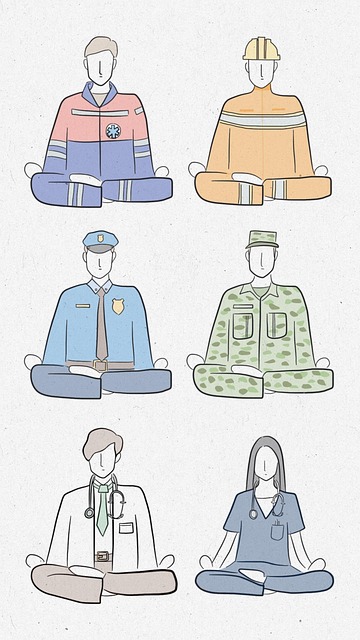Louisville's Crisis Intervention Teams (CITs), comprising trained therapists and counselors, enhance anxiety therapy services by providing prompt, compassionate care for mental health emergencies. Specialized training from programs like Louisville Anxiety Therapy equips professionals with de-escalation techniques and cultural sensitivity, ensuring trauma support is accessible to all. Integrated approaches in CIT training include identifying disorder triggers, fostering cultural understanding, and preventing burnout. These programs have reduced ER visits and improved emotional well-being in Louisville, promoting a more supportive environment for those struggling with anxiety and mental health issues through holistic patient care.
Louisville’s mental health landscape benefits immensely from Crisis Intervention Team (CIT) training programs, especially in anxiety therapy. These specialized teams play a crucial role in effectively managing crises and providing support. This article explores the vital components of CIT training, its impact on the community, and how it fosters a collaborative network for enhanced mental healthcare in Louisville. By understanding the importance of this resource, we can improve crisis response and better serve those struggling with anxiety.
- Understanding Crisis Intervention Teams: A Vital Resource in Louisville Anxiety Therapy
- The Importance of Specialized Training for Effective Crisis Response
- Key Components of Comprehensive Crisis Intervention Team Training Programs
- Benefits and Impact on the Community: Real-World Applications in Louisville
- Building a Supportive Network: Collaborative Approaches to Enhance Mental Health Care
Understanding Crisis Intervention Teams: A Vital Resource in Louisville Anxiety Therapy

In Louisville, anxiety therapy benefits greatly from Crisis Intervention Teams (CITs). These specialized groups are a vital resource, offering immediate and effective support during moments of crisis. CITs typically consist of healthcare providers, including therapists and counselors, who are trained to handle a wide range of situations involving mental health emergencies. By integrating Louisville Anxiety Therapy practices into their protocols, these teams ensure that individuals experiencing anxiety disorders or related traumas receive prompt and compassionate care.
The effectiveness of CITs lies in their ability to foster empathy building strategies and provide trauma support services. Members are equipped with the knowledge and skills to navigate complex scenarios, de-escalate tensions, and offer evidence-based interventions tailored to each individual’s needs. Through regular training, including healthcare provider cultural competency training, CIT members learn to recognize subtle cues and respond sensitively, creating a safe and supportive environment for those in crisis.
The Importance of Specialized Training for Effective Crisis Response

Specialized training is paramount for effective crisis response, equipping professionals with the knowledge and skills to navigate complex situations. Crisis intervention team (CIT) programs, such as those offered by Louisville Anxiety Therapy, focus on providing intensive preparation for mental health practitioners. This training goes beyond general therapy practices, delving into specific strategies for managing crises, including de-escalation techniques, crisis assessment, and intervention planning.
The integration of cultural sensitivity in mental healthcare practice is a key component of these programs. By understanding diverse cultural backgrounds and perspectives, CIT members can offer tailored support, ensuring that trauma support services are accessible and effective for all individuals, regardless of their background. This specialized training not only enhances the quality of care but also fosters a more inclusive and responsive crisis intervention system.
Key Components of Comprehensive Crisis Intervention Team Training Programs

Comprehensive crisis intervention team training programs are meticulously designed to equip professionals with the skills needed to handle diverse and complex situations. These programs often incorporate several key components, ensuring that teams are well-prepared to manage crises effectively. One of the foundational elements is comprehensive training in Louisville anxiety therapy, teaching techniques to identify and alleviate anxiety disorders, a common trigger for crisis situations.
Additionally, fostering cultural sensitivity in mental healthcare practice is paramount. Training should encompass understanding diverse cultural backgrounds, beliefs, and communication styles, enabling team members to provide culturally competent care. Burnout prevention strategies are also integral, focusing on developing inner strength and resilience among team members to sustain long-term performance. This includes teaching stress management techniques, self-care practices, and fostering a supportive work environment.
Benefits and Impact on the Community: Real-World Applications in Louisville

In Louisville, crisis intervention team training programs have been instrumental in enhancing the city’s response to mental health and anxiety-related crises. These programs equip community members with crucial communication strategies and emotional well-being promotion techniques, fostering a more supportive environment for those struggling with anxiety and other mental health issues. By integrating Mind Over Matter principles into their approach, participants learn to de-escalate situations and provide effective interventions that can significantly alter outcomes in real-world applications.
The impact of these training programs is evident in Louisville’s reduced emergency room visits related to mental health crises. Trained individuals are better equipped to handle situations before they escalate, leading to more stable communities and improved emotional well-being for residents. This proactive approach not only benefits those directly affected but also contributes to a general sense of security and peace within the city, making Louisville a model for effective crisis intervention strategies.
Building a Supportive Network: Collaborative Approaches to Enhance Mental Health Care

In developing crisis intervention team training programs, fostering a supportive network is paramount for effective mental health care in Louisville Anxiety Therapy settings. Collaborative approaches that involve various stakeholders—including mental health professionals, peer support specialists, and community organizations—can significantly enhance patient outcomes. By integrating resilience building strategies and burnout prevention techniques, these networks ensure that individuals facing crises receive holistic support tailored to their unique needs.
Mental wellness coaching programs play a crucial role in this network by empowering both clients and care providers. Through mental wellness coaching development, team members learn to cultivate empathy, active listening skills, and effective communication strategies. This not only improves the quality of care but also fosters an environment where everyone feels valued and supported, ultimately contributing to better crisis management and improved mental health outcomes for all involved.
Crisis intervention team (CIT) training programs are instrumental in equipping professionals with the skills to handle mental health crises effectively. As Louisville Anxiety Therapy demonstrates, specialized CIT training enhances community support and response, fostering a more resilient and supportive network for those in need. By integrating comprehensive training components and collaborative approaches, Louisville has set an example for enhancing mental health care, ultimately benefiting the overall well-being of its citizens.














